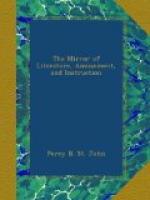Poor Jacko! yet one soul can feel
Sad fellowship with thee;
And we have shared our scanty meal
In bitterness or glee.
Yes! we have shared our last—and
here
Have little now to crave;
No bounty, save a passing tear,
No gift, beyond a grave.
Still let these arms to thy bare breast
Their lingering heat impart;
Come shroud thee in my tatter’d
vest,
And nestle next my heart.
Partners in grief, in want allied,
E’en as we lived, we
die;
So let one grave our relics hold,
Entwined, as thus we lie.
* * * * *
MANNERS AND CUSTOMS.
* * * * *
EARLY INHABITANTS OF BRITAIN.
(To the Editor.)
Your interesting columns have afforded me much gratification by the sketches of the manners of various nations. I am a thorough Englishman in principle, with a sprinkling, however, of German in my veins, and as the early history of this country is a point of great interest, if The Mirror can allow, I will offer a few reflections.
Caesar, speaking of our ancestors, calls them, in blunt and plain Latin “Barbari.” Now Caesar was a disappointed man; he knew but little of this land, he invaded it wantonly, and left it gladly. The Briton was by no means so luxurious as the Roman, but it is wrong to call him a barbarian.
As priests generally (in such periods as those to which we allude,) take good care of themselves, and as the Druids were the chiefs, let us take a few cursory observations upon their manners and customs.
The Druids were priests and magistrates. They were divided into three classes:[7] the bard proper, whose province was philosophy and poetry; the Druid, or minister of religion; and the ovate, or mechanic and artist. These classes were all obedient to one superior—the Archdruid.
[7] Vide Introduction to Owen’s
Translations of the Elegies of
Llywarch
Hen.
The etymology of the word Druid has long been a subject of dispute, many deriving it from the Greek word [Greek: drus], an oak, because it has been affirmed that their mysteries were carried on in oak groves and forests; but as the latter fact is doubtful, consequently the etymology founded upon it is shaken. It has been already stated that the Druids were magistrates and philosophers, and very few etymologists will cavil with me if we fix it at once upon the Celtic word druidh, signifying “a wise man.”
The theological tenets of the Druids were of a most interesting character—professing future punishments and immortality. Their heaven partook of the nature of the Elysian Fields, while their hell[8] was as horrible as the most violent fanatic could depict it. It was a gulph of darkness, where the baneful animal crept, where the cold, gliding serpent maddened the sinner with his envenomed tooth, and hissed the dirge of horror, while the lion prowled along with his noiseless paw, and hungry wolves devoured those whom for their crimes on earth the Druids (unable to conquer or correct) condemned to




